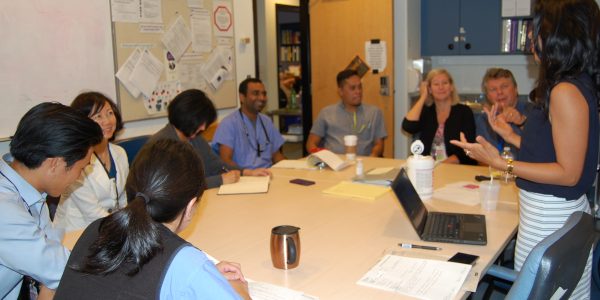Teamwork returns people safely to their own homes
Just a few short years ago, Mrs. Chao’s* prognosis may have looked quite different that it did this past July.
The 87 year old arrived in Richmond Hospital’s ED with a possible fractured hip after taking a serious fall. In the past, a similar accident would have resulted in Mrs. Chao’s admission into an acute care bed to wait for placement into a residential care facility. Her stay would have likely stretched into weeks, possibly months.
Today, however, two multidisciplinary teams work together in the Richmond Hospital ED to transition frail seniors safely and quickly back into their own homes. Known as the ED iCARE team and the Quick Response Team (QRT), they work cooperatively to ease ED congestion and free-up beds for patients in need of admission to acute care.
“Mrs. Chao is a good example of a senior whose frailty is advancing but, with help, can continue to live safely at home with supports,” said Grace Isog, manager, Patient Flow and Care Transitions. “It does help that she has a large and loving extended family, but, really, anyone can return to their own home once the necessary supports are in place.”
Daily rounding and huddles
The ED iCARE process begins each day at 8:15 a.m. with rounding. The ED team along with multiple acute and community stakeholder visits each patient to assess who could possibly be returned to home safely and in a timely manner.
At 11 a.m., the list of possible discharge patients is brought into a huddle for further discussion and consideration. Participation in the huddle includes the ED iCARE team, ED clinicians, Transition Nurse, and Clinical Coordinator, Social Worker, and physiotherapist. The group also includes the QRT’s OT and RN. Together, they address possible barriers to discharge and work together to finalize patient transition details.
Once identified by the ED iCARE team, Richmond’s community-based QRT works with the patient and their family to ensure the appropriate equipment and home health supports are in place and awaiting the patient’s return home. QRT supports patient and the family for approximately two weeks to arrange appropriate community resources and ensure links are re-established with the patient’s own family doctor or primary care provider.
“With any complex and integrated health process, we know that good communication across the entire care team, Acute through Community, is essential,” said Isog. “These processes have been critical for shared learning, building relationships and ensuring strong transition plans are in place for our frail elders.”
Safely back at home
For Mrs. Chao, the existence of the ED iCARE team at Richmond Hospital means she was safely returned to her own home within seven days of her arrival.
“By working together, our Richmond Hospital ED iCARE team and community-based QRT are better able to offer the right care, at the right time, by the right provider,” said Jodi Kortje, director, Critical Care Emergency Medicine Service. “By following this guiding principle we are certain we can avoid unnecessary acute care admissions for our frail elders and return them safely to their homes in a timely and well-supported manner.”
*Not the patient’s real name


Laura Cross, Project Manager
A wonderful collaborative program! We at Island Health are also piloting this wrap around discharge service for the elderly in Nanaimo and we call our service ED2HOME. We created a similar program based on Vancouver Coastal’s successes! And yes, not everyone is suitable for discharge. We have been tracking our daily ED2HOME discharges and find that we send home approximately 50% of those that our team assesses and rounds on.
Helen Taylo
Not everyone can go home…those with significant cognitive decline, who put themselves and others at risk of injury, by their actions, are less likely to be suitable for discharge home